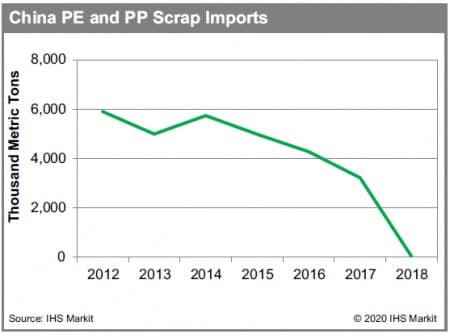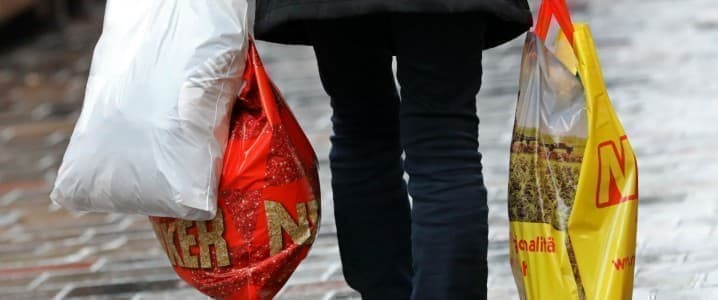Back in 2008, Beijing introduced a nationwide ban on ultra-thin plastic bags in a bid to tame the plastics menace that had earned the nation the reputation as the world's largest generator of waste and also the largest source of waste plastic flowing into our oceans. But more than a decade since the policy was unveiled, use of these banned ultra-thin bags is still rampant, including in Jilin Province, home to the country's strictest restrictions on plastic bags.
And now, Beijing intends to phase in a raft of new anti-plastic regulations as early as the end of 2020.
Beijing plans to ban/prohibit the usage of non-degradable plastic bags in stages. By the end of the current year, Beijing, Shanghai, Tianjin, Chongqing—aka the Four Municipalities—will prohibit usage of non-degradable plastic bags (thicker bags above 25 microns are assumed to be included) in supermarkets, shopping malls, pharmacies, catering packaging, bookstores, and various exhibition conferences. Restaurants will also be banned from using single-use straws by the end of 2020.
By the end of 2022, the bans will be extended to all regions above the prefecture-level as well as in coastal counties before extending out to smaller regions by the end of 2025. Prefectures in China refer to cities that rank below a province but above a county.
Unfortunately, while well-meaning, the latest initiative is unlikely to be succesful given the host of challenges it's about to come up against.
Lack of suitable initiatives
The 2008 plastic ban is by no means the only such venture attempted by the world's largest user of plastics.
In 2013, China introduced the "Green Fence" operation designed in part to improve the quality of the plastics waste coming into the country. Then two years ago, Beijing followed that up with the launch of the "National Sword Campaign" that effectively banned the importation of plastic scrap from other regions. Under the new policy, domestic recycling facilities were placed under strict supervision, with their licenses either canceled or suspended for non-compliance.
The National Sword Campaign proved to be a resounding success, with China's total polyethylene (PE) and polypropylene (PP) plastic waste imports tumbling 99% just a year after the ban as per the Global Trade Atlas (GTA). Related: How 3D Printing Will Reshape The Oil And Gas Industry
Suddenly, China was no longer the world's favorite plastics dumping ground, especially for western nations. The U.S. and EU produce more plastics per capita than any other region in the world, yet their recycling industries remain grossly underdeveloped.
Since 1992, China has been importing nearly half of the world's recyclables and waste, with EU plastic exports to the Middle Kingdom peaking at 300,000 tonnes per month.

Source: IHS Markit
Chinese policymakers have been aggressively pushing biodegradables as a replacement for single-use plastics. Unfortunately, with the ban just weeks away, Caixin Global has reported that biodegradables are likely to fall short due to high production costs, low production capacity, and unfavorable policies.
Another big reason why the newest plastic ban in China might not work: Lack of proper enforcement. Many of China's past prohibitions have merely been used as administrative regulations but not enforced as laws - and the latest regulations could be about to fall into the same trap.
Related: Oil Price Crash Crushes New Mexico’s Hope For Free College
Although Beijing's latest plastic regulations are expected to be incorporated into laws at some point in the future, there's little clarity when this might happen.
Further, penalties for non-compliance have in the past been too minor to act as effective deterrents, and the same trend appears set to continue. For instance, Beijing has warned that companies involved in the illegal production, sale, and use of banned plastics will be added to the "dishonesty record" which would jeopardize their business. That sounds quite ambiguous and hardly the kind of hard-hitting, no-nonsense admonition that would make companies think twice before breaking the law.
Overall, biodegradables, including bioplastics, might not solve China's or the world's massive plastics problem.
Coca-Cola has a product it has dubbed the PlantBottle-which is essentially a new kind of recyclable plastic container consisting of ~30% sugar cane and other plants and the rest coming from traditional oil-based plastic. Sounds like a good start in our quest to get rid of environmental hazards such as the Great Pacific Garbage Patch, weighing in at a staggering 80,000 metric tons. So, how successful has PlantBottle been? Unfortunately, only marginally so. Coca-Cola says PlantBottle packaging accounts for about a third of its North American bottle volume but only 7% globally.
Although the beverage giants like Coca-Cola and Pepsi have increasingly come under public pressure to deal with their plastic pollution, no plastic alternatives that have so far been developed have been anywhere near as cheap or effective as single-use plastics.
Finally, a reality check by Ramani Narayan, professor at the School of Packaging at Michigan State University:
"The concept that we could use it, throw it away, and it doesn't matter where you throw it, and it's going to safely disappear, that does not exist. Nobody could engineer something like that, not even nature."
By Alex Kimani for Oilprice.com
More Top Reads From Oilprice.com:
- A Major Oil Rally Could Be On The Horizon
- Oil Majors Are Paying The Price For Investing In Renewables
- Japan And Kuwait Strike Major Oil Storage Deal


















